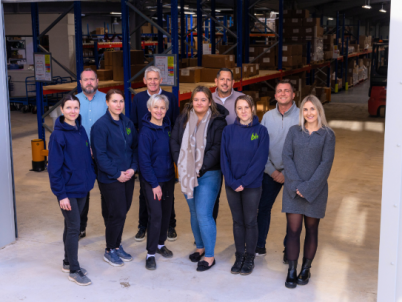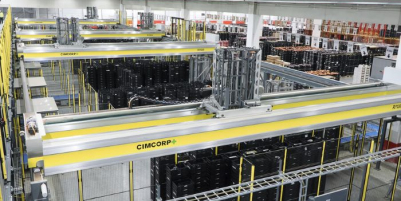-
Nulogy Introduces the Manufacturing Operating System - February 27, 2026
-
Bliss Direct scales to 300 daily orders and saves 25 hours per week with Forterro’s Orderwise ERP - February 25, 2026
-
Wootzwork raises $6.6M to bring predictability to offshore manufacturing - February 25, 2026
-
Rite-Hite unveils new range of hydraulic kits to upgrade and extend dock leveller performance - February 19, 2026
-
REWE and Cimcorp automate fresh supply chain for Berlin supermarkets and stores - February 19, 2026
-
Q1 – A recovery period or time to fix, switch and scale? - February 19, 2026
-
NULOGY’S SHOP FLOOR SOFTWARE TO POWER COMPLETE CO-PACKING’SOPERATIONS - February 13, 2026
-
Why lead generation depends upon good content - February 13, 2026
-
Wallapop and Albatross Sign Strategic Partnership to Bring Real-Time AI Discovery to the Future of Consumer-to-Consumer Commerce - February 12, 2026
-
Thorworld ramp helps Hubergroup to streamline its unloading operation - February 6, 2026
Manufacturing companies often face intense competition in the market and must overcome several unique challenges when implementing and utilising Warehouse Management Systems (WMS). These challenges are often related to the complexity and scale of manufacturing operations. Finding a WMS solution that is straightforward to implement is very important to avoid business disruption. Eric Carter, Solutions Architect at Indigo Software, shares some of the main challenges faced by manufacturers in all industry sectors in this article.
Customisation requirements can prove difficult because manufacturing processes vary significantly between companies. This requires a WMS that can be customised to fit specific operational needs. An off-the-shelf WMS solution may not fully align with the unique workflows and processes of a manufacturing setting, necessitating further customisation, which can be costly and time-consuming. Indigo WMS has been built with easy customisation in mind, enabling manufacturers to tailor the solution to their precise requirements without requiring extensive re-development.
Integration with existing systems and legacy platforms is always a key consideration when purchasing a WMS. Many manufacturers use a variety of systems, such as Enterprise Resource Planning (ERP) and Manufacturing Execution Systems (MES), which have been in place for sometimes decades and need to be integrated with a new WMS. Ensuring seamless integration can be challenging due to incompatible software versions or data formats, requiring skilled integration specialists and thorough testing. Indigo WMS was designed for ease of integration and our consultants have performed many complex integrations with platforms including Oracle, Infor, Microsoft, Sage and SAP.
Manufacturing environments generate vast volumes of data, and the WMS must be capable of handling this data efficiently and also being able to utilise the information to improve business operations. Data handling requirements include the ability to process multiple customer requests simultaneously and a need for maintaining data accuracy and integrity to prevent losses and ensure smooth operations. At the same time, reporting features need to have the power to transform high volumes of data into valuable business insights to support decision making.
Scalability and flexibility can be a trade-off with some WMS platforms. As a manufacturing business grows, a warehouse software system needs to support the addition of new suppliers, customers, and rapidly increasing stock volumes. Indigo WMS is scalable and flexible enough to accommodate this growth without compromising on performance.
Many manufacturers are using paper-based systems to run their warehouses and when implementing a new WMS, they may need to make significant changes to existing workflows. In a traditional business, this can lead to resistance from employees. By offering proven implementation, training and change management strategies when introducing a WMS to the warehouse, manufacturers can ensure that their new software adoption project will be successful, with minimal or no disruptions to productivity.
Some experts describe the WMS as the hub technology of the warehouse, like an orchestral conductor, centralising the control of goods entering and leaving the business. Manufacturing companies need to coordinate closely with their supply chains to ensure timely delivery of raw materials and components. A WMS must be integrated with other materials handling equipment and other transportation and supply chain management tools, to enhance visibility and responsiveness, eliminating any supply chain disruptions.
Addressing these challenges requires careful planning, effective communication, and ongoing support to ensure that the WMS enhances operational efficiency and supports the manufacturing company’s goals. With the right software development partner and a proven WMS solution for manufacturing environments like Indigo, your operations can see almost immediate returns from an implementation.
Example manufacturing industry that benefits from a WMS – food and beverage
Food and beverage companies face several unique challenges when using a WMS due to the specific requirements of handling perishable goods and maintaining product safety and quality. Here are some of the key challenges that Indigo WMS has been optimised to overcome:
Food safety and compliance – the food and beverage industries are highly regulated to ensure that products are safe for consumption. Non-compliance can lead to severe consequences such as product recalls and damage to reputation. Indigo WMS has been developed to comply with stringent food safety regulations, including detailed labelling, packaging, protected storage, handling, and distribution.
Temperature control and monitoring – many food products require specific temperature controls to maintain optimal quality and safety thresholds. Indigo WMS has been designed to integrate with temperature monitoring systems and provide alerts if thresholds are exceeded, preventing spoilage and ensuring compliance with food safety regulations.
Food products typically have specific lot or batch numbers for traceability. Indigo WMS enables accurate tracking of lots and batches throughout the warehouse to ensure compliance with regulatory requirements and facilitate swift product recalls, if needed.
Along with batch traceability is expiry date management and effective management of food products with limited shelf lives is critical . Indigo WMS will manage expiry dates by ensuring effective product rotation, minimise waste and prevent the sale of expired goods. It can also provide alerts when products are nearing their expiry dates to trigger potential promotions.
Efficient inventory management is critical for storing perishable items with limited shelf life. Indigo WMS improves inventory management by reliably forecasting demand and inventory levels accurately, ensuring timely delivery and minimising stockouts or overstocking.
These are just some of the unique challenges facing manufacturers and especially within the food and beverage industry. Indigo WMS has proven to be a robust WMS that can integrate with other systems, provide real-time data, and ensure compliance with key industry standards to maintain product quality and safety for customers.

































